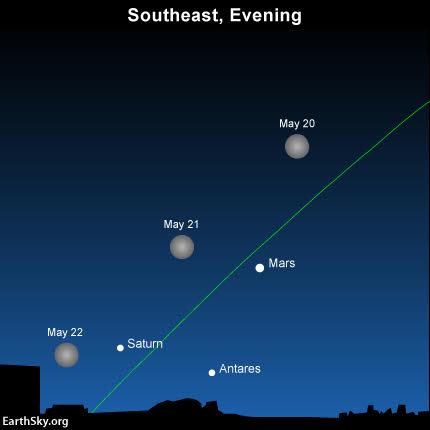Tonight – May 20, 2016 – we’re just one day away from full moon. The moon might appear full to your eye on this date, but it’s really a full-looking waxing gibbous moon. The moon turns full on May 21 at 21:14 Universal Time. Most likely, this full moon won’t appear blue in color, but it’s a Blue Moon all the same, at least by one definition of the term. Plus, it’ll be near Mars, now two days away from its May 22 opposition, to showcase the brightest Mars in 10 years.
That brilliant “star” following the moon across the sky on May 20 is Mars, shining far, far more brilliantly than any star. You’ll see the moon and Mars even closer together as darkness falls on May 21.
Now back up a minute. We said a Blue Moon. But it comes on May 21, and you know – if you know about moon phases – that the moon takes about a month to go from full to full again. A Blue Moon, in recent years, has been defined as the second full moon in a month. The May 21 full moon can’t be that. So what gives?
The May 21 full moon is a Blue Moon according to an older definition of the term. It’s a seasonal Blue Moon: the third of four full moons to occur in a single season.
How often do we have a seasonal Blue Moon? Keep reading …

To astronomers, a season is defined as the period of time between a solstice and an equinox, or vice versa. Most often, a season only has three full moons. This May 2016 full moon counts the third of four to fall between the March 2016 equinox and June 2016 solstice.
A Blue Moon by this definition only comes 7 times in 19 calendar years.
Notice the dates below. You can see that the first full moon of the season comes soon enough after the March 2016 equinox to allow for a fourth full moon to take place shortly before the June 2016 solstice:
Equinox: March 20, 2016
Full moon: Mar 23, 2016
Full moon: Apr 22, 2016
Full Moon: May 21, 2016 (Blue Moon)
Full moon: Jun 20, 2016 (11:02 Universal Time)
Solstice: June 20, 2016 (22:34 Universal Time)
Possible to have only two full moons in a single season?
The next Blue Moon by the better-known definition – two full moons in a calendar month – won’t happen until January 31, 2018. A Blue Moon by this definition comes 7 or 8 times in 19 calendar years.
Click here to learn the history of Blue Moons
Hmm. That seems like a lot of Blue Moons. And doesn’t the phrase “once in a Blue Moon” indicate something precious and rare? Now that there are two well-known definitions for the term Blue Moon, perhaps they’re not that rare after all.
In a period of 19 years, there are 235 full moons but only 228 calendar months (76 three-month seasons). Given that there are 76 seasons and 235 full moons in 19 calendar years, it’s inevitable that at 7 of these 76 seasons should harbor four full moons. In other words, if you’re defining a Blue Moon as the third of four full moons in the same season, you’ll have a Blue Moon once every two to three years.
The 7 seasonal Blue Moons in the next 19-year lunar cycle:
1) May 18, 2019
2) August 22, 2021
3) August 19, 2024
4) May 20, 2027
5) August 24, 2029
6) August 21, 2032
7) May 22, 2035
Astronomical almanacs usually list the time of full moon by Universal Time (UT). The May 2016 full moon comes on May 21 at 21:14 Universal Time. For the U.S. time zones, that translates to 5:14 p.m. EDT, 4:14 p.m. CDT, 3:14 p.m. MDT or 2:14 p.m. PDT. If you wish to find out the full moon time for your time zone, you must convert Universal Time to your time zone. Here’s how to translate Universal Time into your time zone
Bottom line: For all of the world, the May 21, 2016 full moon is the third of four full moons to occur between the March equinox and the June solstice. That’s why it’ll be called by the name Blue Moon! Plus it’ll be near Mars.












